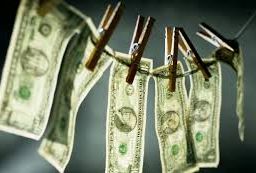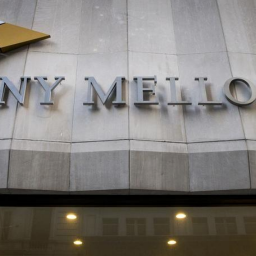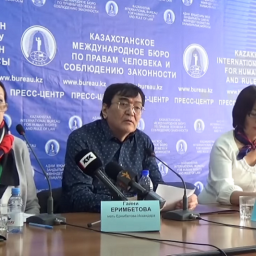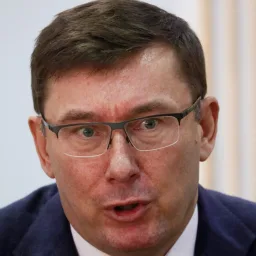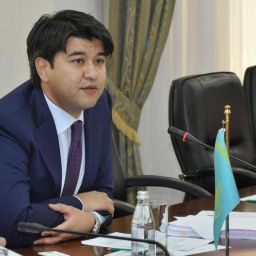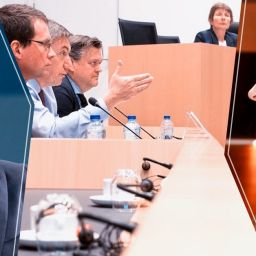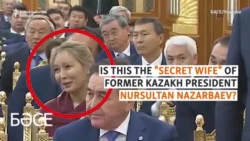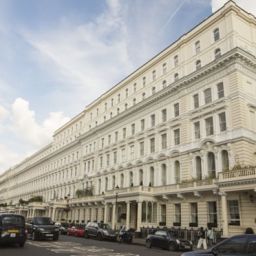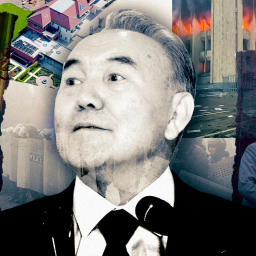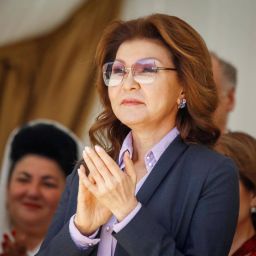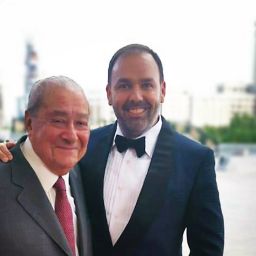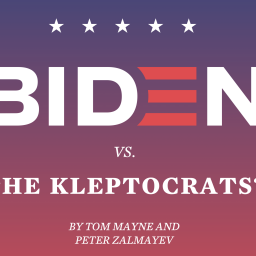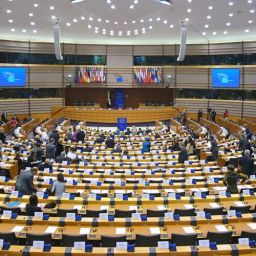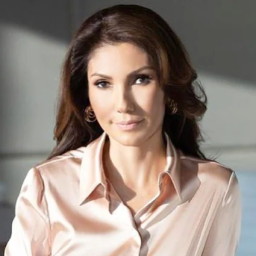Fighting Graft in Almaty Will Also Test Western Anticorruption Commitments
In January, Kazakhstan was in chaos: mass protests against corruption were spreading across the country, prompting its president, Kassym-Jomart Tokayev, to appeal to Russia to send peacekeepers from the Russian-led Collective Security Treaty Organization to help restore order. Today, however, calm has returned to the streets of Almaty and other major Kazakh cities. Now firmly in charge, Tokayev appears bent on demonstrating to Kazakhstan’s long-suffering citizens that, three decades after becoming independent from the Soviet Union, their country is beginning a fresh chapter in its history.
Tokayev is purging Kazakhstan’s government of the influence of his authoritarian predecessor, Nursultan Nazarbayev, who retained significant clout in government and the private sector, even after resigning from the presidency in 2019. Members of Nazarbayev’s family have already been removed from top posts at Kazakhstan’s election commission, its most influential business lobbying group, and its leading oil and gas companies. The head of Kazakh intelligence—Karim Masimov, Nazarbayev’s longtime political ally and two-time prime minister—has been arrested on charges of treason. Tokayev has also announced a major audit and restructuring of Kazakhstan’s sovereign wealth fund, including new personnel recruiting and procurement procedures intended to diminish cronyism, which is believed to be valued at $69 billion and to control at least 55 percent of the country’s assets.
But Kazakhstan’s oligarchic network extends well beyond its borders. A 2019 KPMG report estimated that the 162 richest Kazakhs control fully half of the country’s wealth, most of which is now held offshore in Geneva, London, New York, Paris, and other global financial centers, beyond the reach of the Kazakh authorities. In an address to his cabinet in early February, Tokayev ordered his government to devise plans for repatriating these assets within two months. He also pointedly noted the $5.7 billion discrepancy between China’s and Kazakhstan’s official reporting on the volume of trade between the two countries, suggesting cross-border smuggling on a massive scale. Importantly, Tokayev’s own credentials as a reformer remain in doubt, as a recent report by the Organized Crime and Corruption Reporting Project (OCCRP) also revealed that Tokayev and his family members themselves had accumulated significant wealth overseas, including Swiss bank accounts, a UK-registered company, and real estate holdings in Russia and Switzerland.
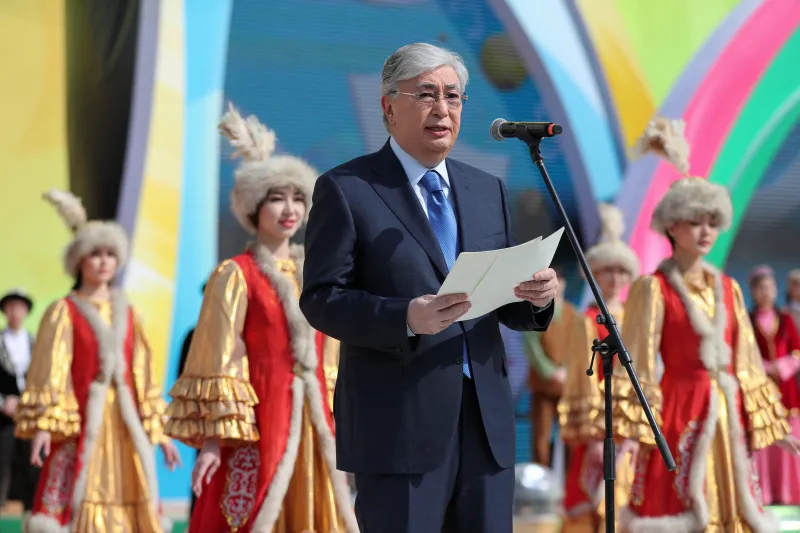
Even locating these assets presents logistical and legal challenges that will take the Tokayev government years, not months, to overcome. The former ruling family and its enablers spent decades stashing illegally acquired state funds overseas, in preparation for just such a global asset hunt. Most of the Nazarbayev clan’s vast offshore holdings remain hidden. Efforts to find and repatriate them will not only complicate Kazakhstan’s political transition but also draw in Western lawyers, accountants, and reputation-management firms—while challenging Western governments to actually implement their global anticorruption commitments.
A DEAL BETWEEN LEADERS
Soon after the January unrest had been subdued, Tokayev appeared to strike a deal with Nazarbayev. Throughout the crisis, Tokayev had blamed the persistent economic inequality that drove many of the protesters focused on the Nazarbayev family’s corruption. In his first public appearance after the demonstrations, Nazarbayev denied any political rift with his successor, demurely claiming that he was just an ordinary pensioner now, hoping for a quiet retirement. In exchange for being allowed to retire in Kazakhstan, Nazarbayev suggested, he has accepted Tokayev’s authority and withdrawn himself and his inner circle from positions of political and economic influence.
There is a problem with this apparently peaceful transition pact, however. Neither Tokayev, nor the ministry of finance, nor the central bank, nor the prosecutor general’s office knows the true extent of the Nazarbayevs’ global holdings. As the scale and scope of the family’s offshore financial empire is eventually revealed, this pact is likely to be strained and even contested.
As John Heathershaw and I argued in our book, Dictators Without Borders, when Central Asian autocrats consolidated power in their home countries in the 1990s, they took advantage of global financial liberalization and the rise of offshore banking and shell companies to export the enormous fortunes they amassed through the privatization and acquisition of state-operated assets. When some former regime insiders became political opponents and fled into exile, Central Asian governments pursued them and their fortunes abroad. As a result, power struggles in Kazakhstan and other Central Asian countries have for years been waged overseas through foreign arbitration hearings in far-flung courtrooms, tips and document leaks to foreign newspapers, and aggressive public relations campaigns.
No one in the current Kazakh government knows the true extent of the Nazarbayevs’ global holdings.
In 2013, Forbes estimated the fortune of Nazarbayev’s eldest daughter, Dariga Nazarbayeva, at $595 million. Nazarbayev’s middle daughter, Dinara Kulibayeva, and her husband, Timur Kulibayev, made the magazine’s billionaires list in 2021. The Nazarbayev daughters’ fortunes, like those of other Kazakh oligarchs, are distributed globally and often held in luxury real estate. A recent Chatham House report found that Kazakh oligarchs own more than £500 million ($628 million) in central London real estate, most of it purchased via companies registered offshore. Over £330 million ($414 million) of these properties—including the 221B Baker Street address made famous by its onetime fictional tenant, Sherlock Holmes—are believed to belong to the Nazarbayevs themselves. In 2007, British media reported that Kulibayev had purchased the Duke of York’s Sunninghill estate for £15 million ($22 million). In 2020 a Radio Free Europe investigation identified over $250 million in property belonging to Nazarbayev family members in the Czech Republic, France, Spain, Switzerland, and the United States.
Investigations into the extent of Nazarbayev’s own holdings are just beginning to bear fruit. The OCCRP revealed in January that Nazarbayev personally controls four private foundations containing a combined $8 billion in assets—including foreign bonds, regional banks, telecoms, shopping centers, hotels, and even a private jet—all purchased through holding companies registered in the United Kingdom and Luxembourg. One of these, the Nazarbayev Foundation, states that its primary purpose is to support education at Nazarbayev University, in Astana. Unlike most university endowments, however, the foundation does not publish annual reports, lists no trustees, and provides no information on external donations, though it has been infused with billions in state capital. Despite their nonprofit status, the report observes, these foundations “actually own larger business portfolios than many multinational conglomerates.”
In the 1990s, Nazarbayev was found to be the recipient of a series of bribes funneled via a network of Swiss bank accounts on behalf of major Western oil companies. In 2013, a Wall Street Journal investigation implicated Kulibayev in a kickback scandal involving the China National Petroleum Corporation’s acquisition of a portion of a Kazakh state energy company. In 2020, the Financial Times published a series of documents revealing Kulibayev’s complex and highly lucrative manipulation of intermediary companies involved in the construction of the China-Central Asia pipeline. And a previous OCCRP investigation found that two wealthy Nazarbayev cronies had funneled $30 million via offshore networks to Nazarbayev’s unofficial third wife, Assel Kurmanbayeva.
Ironically, as Tokayev prepares to wage a global campaign to reclaim Kazakhstan’s stolen wealth, he will likely draw on his government’s experiences pursuing exiled political dissidents and regime insiders-turned-whistleblowers. These include an aggressive campaign against Nazarbayev’s former son-in-law, Rakhat Aliyev, who died under mysterious circumstances in an Austrian jail in 2015 while awaiting extradition to Kazakhstan. Similarly, the Kazakh government has spent hundreds of millions pursuing the global holdings of Mukhtar Ablyazov, a former chair of Kazakhstan’s BTA Bank who eventually became an exiled opposition leader. According to Kazakh authorities, Ablyazov embezzled billions before fleeing Kazakhstan for political asylum in France.
The Kazakh government’s pursuit of Ablyazov sparked global outrage in 2013 when Italian police seized Ablyazov’s wife and six-year-old daughter from their home in Rome and returned them to Kazakhstan on a private jet under the watchful eye of the Kazakh ambassador—an operation that a group of UN experts later characterized as an “extraordinary rendition.” Whether the strategies Kazakhstan uses to root out the Nazarbayevs’ global financial holdings ultimately involve such tactics remains to be seen. They will certainly be complex, expensive efforts involving dozens of lawyers, forensic accountants, investigators, and public relations specialists. If they fail, or simply drag on, the Nazarbayevs will be all too aware that few parts of the world are safe from the long arm of the Kazakh state and the security services they helped create.
WESTERN ANTICORRUPTION EFFORTS
For the United States and the United Kingdom, which have experience handling corruption allegations involving Kazakhstan’s ruling elite, the Tokayev government’s battle to recover the country’s stolen wealth provides an opportunity to test the effectiveness of their new anticorruption initiatives.
In December 2021, the Biden administration unveiled a new strategy for fighting corruption, which it had repeatedly identified as a national security priority for the United States. The strategy is notable in that it targets both foreign kleptocrats and their American enablers who use their professional expertise to assist with the laundering of money and reputations. But the policy itself gives little guidance as to how, operationally, anticorruption efforts can be integrated into foreign policy planning, especially when confronting the thorny issue of one autocratic government going after former autocratic elites.
Anticorruption interventions overseas can have profound political consequences for the countries involved.
This is a different problem than the attempts to interfere in sensitive anticorruption investigations that U.S. officials have confronted with depressing regularity. In 2000, the U.S. Department of Justice began investigating James Giffen, an American businessman who served as Nazarbayev’s economic adviser, for allegedly funneling millions in payments from American oil companies into Swiss bank accounts on behalf of Kazakh officials. Despite Nazarbayev’s persistent lobbying, the George W. Bush administration, much to its credit, refused to interfere in the case. The Department of Justice arrested Giffen in 2003 and charged him with bribery. (Ultimately, Giffen escaped with a small fine after the presiding judge accepted his claims that he had acted in Kazakhstan on behalf of U.S. government interests.)
The task at hand, as Kazakhstan launches a global effort to recover its stolen assets, is trickier. The coming challenge for the United States will be about how to integrate work on new anticorruption directives with work on other U.S. foreign policy goals. By sanctioning or pursuing the Nazarbayev family’s overseas assets, the United States may be demonstrating its commitment to fighting corruption, but it would be doing so in support of a Kazakh government whose commitment to political reform it cannot yet fully trust.
Anticorruption interventions overseas can have profound political consequences for the countries involved. Over the last decade, for example, three international telecommunications firms operating in Uzbekistan have been fined by the U.S. Securities and Exchange Commission for attempting to bribe Gulnara Karimova, the powerful daughter of former President Islam Karimov, in their quest for access to the country’s lucrative cell phone market. The fines and global investigations proved highly damaging to Karimova politically, leading to the Uzbek government’s arrest of Karimova and her associates in Uzbekistan. U.S. officials considering action to repatriate Kazakh government assets should take steps to ensure that the Tokayev government will transparently deposit the funds in an earmarked account that can be dedicated to supporting Kazakhstan’s fledgling civil society—including its anticorruption watchdogs and investigative journalists—and anticorruption educational programs and training for civil servants.
The United Kingdom has also introduced several new anticorruption tools that could speed the repatriation of Kazakhstan’s stolen assets. Last year, Dariga Nazarbayeva successfully fought an unexplained wealth order by the United Kingdom’s National Crime Agency, which had frozen over £80 million ($100 million) worth of luxury properties she owned. In deciding the case in her favor, the British judge argued that Kazakhstan’s prosecutor general’s office had backed Nazarbayeva’s claim that the origins of her wealth were not improper. A change in the Kazakh government’s posture toward Nazarbayev family members and associates could make the outcome of similar future actions quite different.
LONGTIME WESTERN ENABLERS
The former Kazakh president spent years obsessing over his overseas reputation and spent significant sums on burnishing his image abroad. Reputable Western institutions willingly promoted the narrative that Nazarbayev was a skillful steward of Kazakhstan’s independence and sovereignty. Most conceded privately that he was an autocrat, but the “soft authoritarianism” associated with Nazarbayev’s cosmopolitan public image was then considered the price for maintaining political stability and friendly relations.
The range of Western actors complicit in building the myth of Nazarbayev is long: Western think tanks gratefully accepted millions in Kazakh funding, held events that celebrated U.S.-Kazakh relations, and downplayed the regime’s poor human rights record. Administrators at prestigious universities were happy to forge high-profile partnerships with Nazarbayev University without questioning the origins or opaque governance of the foundation that funded them. The Kazakh government successfully retained high-priced U.S. and European lobbyists and advisers to project an image of an enlightened despotism that aspired to ensuring political stability with some openness to the world.
In Kazakhstan, popular discontent with the government’s lack of reforms continues to simmer. Tokayev’s turn to Russia for peacekeepers appears to have left him uncomfortably indebted to Russian President Vladimir Putin. The war in Ukraine has forced Kazakh officials into an uneasy neutrality—avoiding condemnation of Putin’s invasion in public and in United Nations votes, but sending humanitarian aid to Ukraine. Tokayev resisted Russian pressures to send troops, yet Kazakh officials are alarmed about the impact of Western sanctions. One survey of Kazakh public attitudes found backing for Russia’s invasion of Ukraine—the likely result of Russian state media coverage—with another suggesting considerably more support for Russia’s war aims to protect the Donbas among Kazakhstan’s smaller self-identified Russian population than among the 70 percent who claim a Kazakh ethnic identity, raising the prospect that the country’s own internal ethnic balance could become a geopolitical fault line. The global campaign to reclaim Kazakh wealth and rid Kazakh institutions of Nazarbayev’s influence is underway, but it is likely to implicate a greater and more varied group of international actors than even the most impassioned critics of Nazarbayev could ever have imagined.
Original source of article: www.foreignaffairs.com
